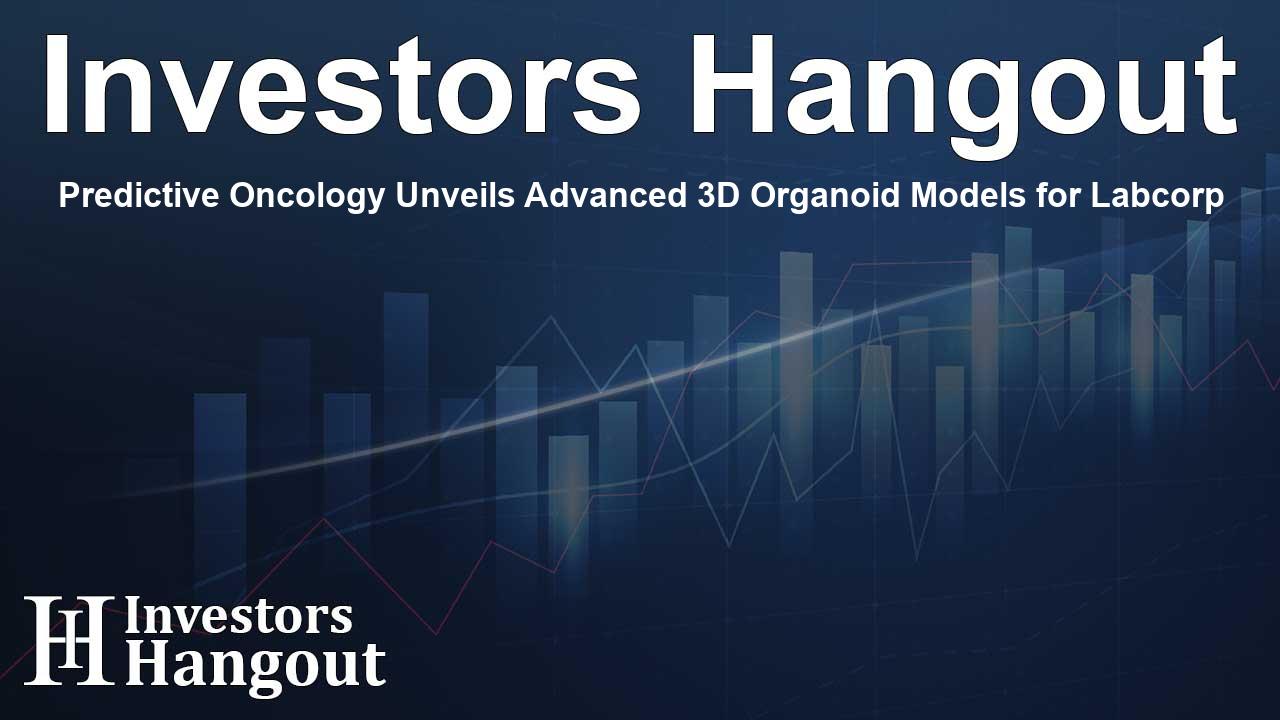Predictive Oncology Unveils Advanced 3D Organoid Models for Labcorp

Innovative 3D Organoid Models Developed for Labcorp
Predictive Oncology Inc. (NASDAQ: POAI) has announced a significant achievement in the realm of artificial intelligence and drug discovery. The company has successfully designed functional 3D organoid models, specifically for Labcorp, a renowned provider of laboratory services. This strategic collaboration marks a pivotal moment in enhancing the capabilities of drug evaluation and development.
Creating Unique Liver Toxicity Models
As part of their ongoing partnership, Predictive Oncology has crafted two specialized 3D liver toxicity models for Labcorp, encompassing both human and rat organoid variations. These models reflect the complex liver microenvironment, enabling precise assessments of how drugs are metabolized and the potential toxic effects on liver function.
Advancing Drug Evaluation Processes
Dr. Arlette Uihlein, who serves as the Senior Vice President of Translational Medicine and Drug Discovery at Predictive Oncology, emphasized the significance of these 3D organoid models. "The goal of these models is to provide accurate predictions regarding in vivo drug clearance and hepatotoxicity related to various compounds," she stated. By incorporating these advanced models, researchers can leverage highly relevant data that accurately reflects human physiology.
Integrating Organ Models with AI Technology
These newly developed organoid models seamlessly enhance Predictive Oncology's existing AI-driven platforms, which also include 2D cell cultures and 3D spheroids built from actual human tumor samples. This innovative approach aims to expedite drug discovery and identify critical biomarkers, all while tapping into an extensive biobank exceeding 150,000 frozen tumor samples.
Labcorp’s Commitment to Innovative Research
According to John Kendrick, Ph.D., a strategy lead for Labcorp, the company is deeply invested in using new approach methodologies (NAMs) for preclinical research. The introduction of these organoid models promises to speed up the evaluation of new potential therapies, ultimately reducing the time it takes for these medicines to reach patients. Labcorp is poised to explore the feasibility of expanding this research to other species, further bridging the gap between animal studies and human applications.
The Role of Organoids in Personalized Medicine
Recent studies highlight that with the increasing focus on personalized medicine and advances in biotechnology, organoid-based platforms are becoming vital in revolutionizing healthcare. They are instrumental in enhancing drug development processes, diminishing the dependence on traditional animal models, and aiding in the progression toward next-generation therapeutic strategies.
Functional Insights into Cancer Treatments
The 3D organoid models produced in collaboration with Labcorp feature specialized matrices and media supplements, yielding insights into how cancer therapies perform in actual patient scenarios. Noteworthy data outcomes include the visualization of cell junction formations and evaluations pertinent to hepatotoxicity, confirming cellular viability over extended periods.
About Predictive Oncology
Predictive Oncology is at the forefront of integrating AI and machine learning technologies to streamline early drug discovery, ultimately benefiting cancer patients worldwide. Their AI platform, known as PEDAL, boasts a remarkable 92% accuracy rate in predicting tumor responses to specific drug compounds, facilitating informed selections for further testing. Coupled with an expansive biobank of diverse human tumor samples, Predictive Oncology delivers some of the broadest solutions in AI-driven drug discovery, further strengthened by its accredited laboratory facilities.
Frequently Asked Questions
What are the main goals of the 3D organoid models developed by Predictive Oncology?
The primary goal is to predict in vivo drug clearance, transport, and hepatotoxicity, allowing for better drug evaluation.
How do these models improve drug discovery?
They provide species-specific and physiologically relevant data, enhancing understanding of drug behaviors in patients.
What is the significance of Labcorp in this partnership?
Labcorp's commitment to innovative methodologies aids in expediting the evaluation of new therapies for patients.
How many tumor samples does Predictive Oncology have?
Predictive Oncology maintains a biobank with over 150,000 tumor samples available for research and drug discovery.
What is the accuracy rate of Predictive Oncology's AI platform?
The AI platform, PEDAL, has a predictive accuracy of 92% for determining if a tumor will respond to specific drugs.
About The Author
Contact Logan Wright privately here. Or send an email with ATTN: Logan Wright as the subject to contact@investorshangout.com.
About Investors Hangout
Investors Hangout is a leading online stock forum for financial discussion and learning, offering a wide range of free tools and resources. It draws in traders of all levels, who exchange market knowledge, investigate trading tactics, and keep an eye on industry developments in real time. Featuring financial articles, stock message boards, quotes, charts, company profiles, and live news updates. Through cooperative learning and a wealth of informational resources, it helps users from novices creating their first portfolios to experts honing their techniques. Join Investors Hangout today: https://investorshangout.com/
The content of this article is based on factual, publicly available information and does not represent legal, financial, or investment advice. Investors Hangout does not offer financial advice, and the author is not a licensed financial advisor. Consult a qualified advisor before making any financial or investment decisions based on this article. This article should not be considered advice to purchase, sell, or hold any securities or other investments. If any of the material provided here is inaccurate, please contact us for corrections.
